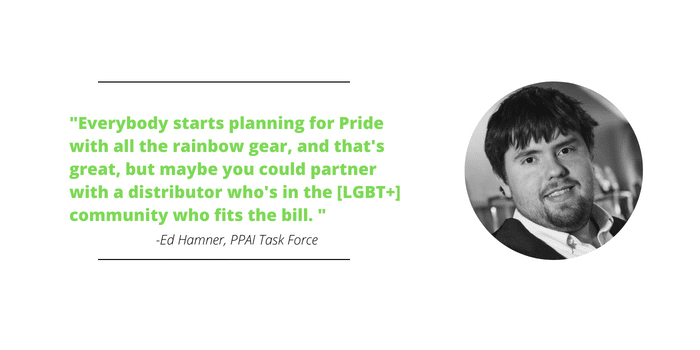It was during 2021’s PPAI Expo Direct-2-You that Ed Hamner first heard about the possibility of being a member of PPAI’s Diversity, Equity and Inclusion Task Force. The task force would have the flexibility to take different shapes, incorporate different insights and approach different goals, but the Association wanted passionate member volunteers who might be willing to educate the industry on perspectives that might not naturally be top of mind for everyone.
“I volunteered because I’m a big proponent of supplier diversity, equity and inclusion, because honestly, I live it,” says Hamner, whose company Howling Print & Promo (PPAI 593535, D1) is certified as a LGBT Business Enterprise (Certified LGBTBE). “It’s brought in business. I can see how it helps.”
Later this summer, PPB Newslink will have more about the importance of diversity certification programs.
But the message that Hamneris trying to express to the industry as a member of the DEI Task Force, is that the help that he’s referring to is much needed, not just in the LGBTQ+ community of which he is a member of but to overcome the disadvantages faced by so many minority- and women-owned businesses.
Howling Print & Promo, out of Chardon, Ohio, offers promotional products like apparel, printed products and signs. Hamner’s business is small compared to some of the larger distributors in the industry, but he’s still managed to work with huge brands like Bridgestone. It takes LGBTBE certification and other diversity initiatives for a company like Hamner to, as he puts it, “get a seat at the table” of the larger brands looking for promotional work.
That seat, unfortunately, rarely comes organically. The DEI Task Force, currently led by Cindy Tsuji of Image Source Inc. and including volunteers from companies small and large, wants people to know that strengthening supplier diversity, equity and inclusion will, in turn, strengthen what the industry has to offer. For Hamner, that’s all about education, education, education.
“People keep thinking about the oversimplified idea of affirmative action,” Hamner says. “That’s what they think supplier diversity is. It doesn’t eliminate [anyone] from the playing field, but it helps bring people onto the playing field.”
Indeed, LGBT-owned businesses and entrepreneurs are more likely to face disadvantages in hiring, attaining licenses, or attaining capital or funding. A 2016 study by StartOut reported that nearly 40% of LGBTQ+ entrepreneurs said they chose not to self-identify as members of the LGBTQ+ community, whether because it wasn’t deemed relevant or they were concerned doing so might hurt their chances of receiving capital.
According to Hamner, there’s a lack of education on why programs like diversity certifications are needed, how they work, who they benefit and why they are detrimental to no one. He says that he has seen industry pushback from diversity education on places like Facebook groups, not to mention the lack of LGBT certified suppliers.
Part of that is sheer resistance, but Hamner attributes some of it to potential fatigue based on larger diversity conversations happening in society. “I think a lot of the noise in the political world hampers our DEI Task Force mission a little bit because everybody’s talking about it in the broadest way so they kind of get overwhelmed with it,” Hamner says. “And they’re either tuning it out or they’re like ‘Yeah well, it’s really nice but we hear about it so much,’ so they kind of ignore it.”

To some extent, that logic is understandable. Many of these topics are presented to Americans in a sort of “for or against” depiction that leaves little room for the specifics. “The DEI conversations we’re having as a task force, it’s just a smaller ecosystem compared to North America or the world,” Hamner says.
It is still legal in many states to fire someone for identifying as LGBTQ+.
If anything, one’s own industry can present an opportunity to see problems from an ecosystem that you’re already an expert within. When you can see an issue for what it is then it becomes easier to recognize that there is always another solution, another step, beyond the one currently being taken.
June is Pride Month. Hamner says, “ “Everybody starts, you know, planning for Pride, and the rainbows and all the rainbow gear, and that’s great. “But you could say, ‘Hey maybe just for one job, let’s partner with another distributor who’s in the [LGBTQ+] community that would fit the bill.’ Most people don’t even realize that’s a thing.”
Hamner went with “cautiously optimistic” to describe how he feels about the industry’s ability to put a genuine emphasis on diversity, equity and inclusion. “There’s a lot of work to be done,” he says. “There’s a lot of understanding, as an industry as a whole that needs to be done. But that will be the growth of our industry. The world has changed from when I joined the industry and that was 10 years ago. I think that’s where the industry has to change with it.”
The world changing isn’t anything new. Industries need to adapt to that change, and recognize the inequality that customers are passionate about. That’s what PPAI’s DEI Task Force is meant to help them with.
“I think the task force is definitely up to the challenge to help educate, but it’s also a matter of the industry as a whole. They have to want to be educated,” says Hamner.
Every time that you educate a person there’s an opportunity for change, so Hamner is in this mission for the long haul.
“I’ll stay on until either they get rid of the task force or the task force decides that the mission is done.”


